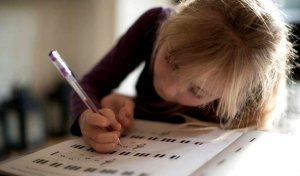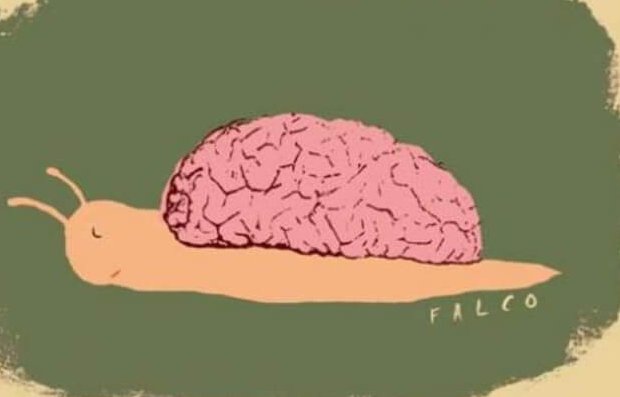Are There Problems with Our Students, or Our Educational System?

You can’t talk about learning without talking about the educational system. These two things are closely linked and they constantly influence each other. One problematic consequence of the way our educational system is set up is the tendency to label children as slow learners. It’s problematic because it sets the parameters for an ideal learning speed – but only learning that occurs within the system itself.
Most educational systems in the world are rigidly standardized. They define what people should learn, how, and when. They also define the methods that are used to evaluate whether these goals are being achieved.
“Whosoever wishes to know about the world must learn about it in its particular details. Knowledge is not intelligence.”
-Heraclitus-
The modern educational system
Our system establishes what constitutes slow learning. People generally believe that the system is correct and that individuals should be able to respond to what it demands and function appropriately. If not, they must have a deficit, or something must be corrected. Students receive labels like slow, quick, intelligent, and unintelligent. And the worst part is, these labels are the starting point on the path towards academic success or failure.
Slow learning, or just different?
This is a true story. A third-grader began the school year having difficulty reading and writing quickly. His teacher often pointed out that he was the worst one in the class. She would write sentences on the board and for the students to copy, and he was always the last to finish.

Because she couldn’t wait for him, the teacher always erased the board and demanded that he catch up later in the day with a friend’s notebook. One day, after more of the same, the teacher couldn’t find the eraser. The boy had taken it and hidden it without anyone noticing. He finished the transcription and then went up and erased the board.
Is it fair to say that this boy is unintelligent? If you define intelligence as the ability to use available information to solve problems, then we should conclude that he is brilliant. The story implies that he used a process of analysis that involved defining the problem, evaluating the available alternatives, and reaching a solution. His action was also an ethical one, since he never tried to hide his behavior – he just wanted to claim his right to have the same opportunity as everyone else.
The boy was punished for what he did. He “wasted” his classmates’ time and defied the teacher’s orders. All she cared about was that the children could copy the text in the average amount of time.
Each student learns at their own pace and in their own context
All teachers, and the educational system in general, preach that learning is a comprehensive process. It involves cognitive, emotional, relational, and symbolic processes, among many others. At least that’s what they say. But how many teachers actually consider their students’ home situation when thinking about the learning conditions they’re subjected to?

In Bogotá, Colombia, one public school piloted a learning program that applied the pedagogical methods of Jean Piaget. To him, the content of learning wasn’t as important as the mental process involved. In this school, they eliminated tests, courses, and subjects. Instead, every child could enroll in the classes they wanted, and their performance was never numerically evaluated.
The results were surprising. The students could go to the same class several times if they wanted to, and they were motivated to do so. Performance increased significantly, and learning was much more effective. Because they didn’t pass or fail, they were more open about when and why they didn’t understand things. The students felt like school was their favorite place. A similar thing happened at the so-called Miracle School in Barcelona, Spain.
So before pathologizing or stigmatizing a child by telling them that they’re a slow learner, that they have an attention deficit, that they’re intellectually delayed, we should instead diagnose the educational system in which they’re being judged and labeled.
It’s also important to analyze each student’s situation. Is something going on at home or in their personal lives that’s making them anxious or depressed? Does their home environment facilitate learning? Beyond neurological considerations, we still have a lot to debate on the subject.

You can’t talk about learning without talking about the educational system. These two things are closely linked and they constantly influence each other. One problematic consequence of the way our educational system is set up is the tendency to label children as slow learners. It’s problematic because it sets the parameters for an ideal learning speed – but only learning that occurs within the system itself.
Most educational systems in the world are rigidly standardized. They define what people should learn, how, and when. They also define the methods that are used to evaluate whether these goals are being achieved.
“Whosoever wishes to know about the world must learn about it in its particular details. Knowledge is not intelligence.”
-Heraclitus-
The modern educational system
Our system establishes what constitutes slow learning. People generally believe that the system is correct and that individuals should be able to respond to what it demands and function appropriately. If not, they must have a deficit, or something must be corrected. Students receive labels like slow, quick, intelligent, and unintelligent. And the worst part is, these labels are the starting point on the path towards academic success or failure.
Slow learning, or just different?
This is a true story. A third-grader began the school year having difficulty reading and writing quickly. His teacher often pointed out that he was the worst one in the class. She would write sentences on the board and for the students to copy, and he was always the last to finish.

Because she couldn’t wait for him, the teacher always erased the board and demanded that he catch up later in the day with a friend’s notebook. One day, after more of the same, the teacher couldn’t find the eraser. The boy had taken it and hidden it without anyone noticing. He finished the transcription and then went up and erased the board.
Is it fair to say that this boy is unintelligent? If you define intelligence as the ability to use available information to solve problems, then we should conclude that he is brilliant. The story implies that he used a process of analysis that involved defining the problem, evaluating the available alternatives, and reaching a solution. His action was also an ethical one, since he never tried to hide his behavior – he just wanted to claim his right to have the same opportunity as everyone else.
The boy was punished for what he did. He “wasted” his classmates’ time and defied the teacher’s orders. All she cared about was that the children could copy the text in the average amount of time.
Each student learns at their own pace and in their own context
All teachers, and the educational system in general, preach that learning is a comprehensive process. It involves cognitive, emotional, relational, and symbolic processes, among many others. At least that’s what they say. But how many teachers actually consider their students’ home situation when thinking about the learning conditions they’re subjected to?

In Bogotá, Colombia, one public school piloted a learning program that applied the pedagogical methods of Jean Piaget. To him, the content of learning wasn’t as important as the mental process involved. In this school, they eliminated tests, courses, and subjects. Instead, every child could enroll in the classes they wanted, and their performance was never numerically evaluated.
The results were surprising. The students could go to the same class several times if they wanted to, and they were motivated to do so. Performance increased significantly, and learning was much more effective. Because they didn’t pass or fail, they were more open about when and why they didn’t understand things. The students felt like school was their favorite place. A similar thing happened at the so-called Miracle School in Barcelona, Spain.
So before pathologizing or stigmatizing a child by telling them that they’re a slow learner, that they have an attention deficit, that they’re intellectually delayed, we should instead diagnose the educational system in which they’re being judged and labeled.
It’s also important to analyze each student’s situation. Is something going on at home or in their personal lives that’s making them anxious or depressed? Does their home environment facilitate learning? Beyond neurological considerations, we still have a lot to debate on the subject.

This text is provided for informational purposes only and does not replace consultation with a professional. If in doubt, consult your specialist.







